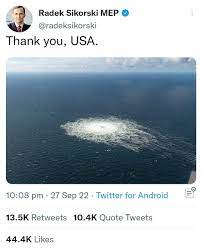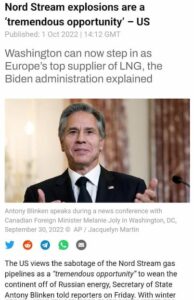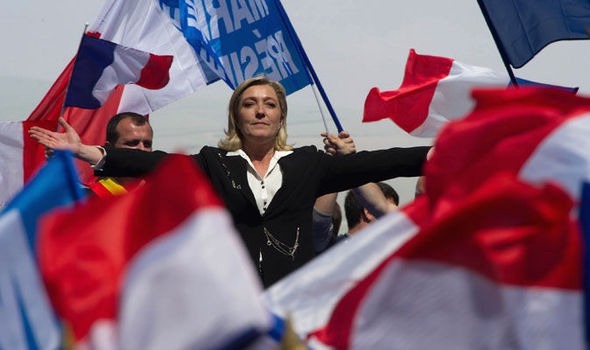The attacks on the Nord Stream pipelines in late September were an extraordinary international and geopolitical event: the true cause of which has still not yet been resolved.
Or admitted to, to perhaps be more accurate.
Any claims of pure accidental causes were rendered moot immediately by the Nord Stream pipelines’ obvious significance and centrality to the ongoing War in Ukraine and to the ongoing sanctions campaign against Russia and the tensions in the relationship between Russia and Europe: all of which has been at the forefront of international affairs since Russia’s military incursion into Ukraine in February this year (and everything that has followed since).
On September 26th, there was a series of detonations at two of the pipelines, which sent gas spewing to the surface of the Baltic Sea. These explosions apparently triggered gas leaks at four locations. Two of these were in Denmark’s ‘economic zone’ and two in Sweden’s.
The importance of Nord Stream 1 and 2 to both Russia’s economy and Europe’s energy supply – and to Russian/European relations – cannot be overstated.
With any kind of accidental cause ruled out, it made sense for all sides to immediately cite deliberate sabotage.
The European Union was clear from the start that it suspected deliberate sabotage: and warned that a deliberate attack on Europe’s energy infrastructure was “utterly unacceptable”. There was a vagueness in the language here that suggested EU officials were not necessarily inclined to blame Russia: at least not yet.
Naturally, the US and most Western officials implicated Russia in sabotage of its own pipelines: while Russia implicated the US and its allies. Putin claimed that the Nord Stream sabotage was an “Anglo Saxon” plot (“Anglo Saxon” being Putin’s shorthand for the US/UK axis).
A brief and not especially forensic perusal through available evidence and the behaviour and responses of various international parties does more than enough to provide us an approximate sense of what may have been behind the sabotage of the pipelines.
Here’s a question to start with, for example. Why is Sweden refusing to conduct a joint investigation into the Nord Stream sabotage?
As Reuters reports on October 14th: ‘Sweden has rejected plans to set up a formal joint investigation team with Denmark and Germany to look into the recent ruptures of the Nord Stream 1 and 2 pipelines…’
Mats Ljungqvist, the Swedish prosecutor investigating the leaks, is quoted as complaining that ‘such a joint investigation would include legal agreements under which Sweden would have to share information from its own investigation that it deemed confidential…‘
He further elaborates, “This is because there is information in our investigation that is subject to confidentiality directly linked to national security.”
Curiously, according to the same Reuters article, the German TV programme Tagesschau on German public broadcaster ARD claimed that Denmark had also turned down setting up a joint investigation team with Germany.
Given that it was Sweden’s and Denmark’s ‘economic zones’ in which the pipeline explosions apparently took place, this behaviour is more than curious.
Meanwhile, American response to the Nord Stream sabotage has been more than a little telling.
For example, Secretary of State Anthony Blinken referred to the disruption of the gas pipelines as a “tremendous opportunity” to sever Europe from Russian energy dependence. Going even further, Blinken enthused that the US was “now the lead supplier of [liquefied natural gas] to Europe.”
President Biden himself, as far back as February 7th (which was pre Russian invasion: oops, I mean ‘special operation’), had made open and direct threats against the pipelines. So US hostility towards Nord Stream was hardly a secret.
Former Polish Foreign Minister and Minister of Defense, Radoslaw Sikorksi, even posted a photograph of gas escaping the damaged pipelines… and thanked the United States for carrying out the attack!
Curiously, this tweet appears to have now been deleted/removed (but there’s a screenshot of it below). What did Mr Sikorski know – and why was he being so brazen about it? Poland’s possible role in the Nord Stream attacks is also something to consider: which we’ll circle back to shortly.
___________________
The damage to the pipelines isn’t a minor problem, by any means. According to Russia’s energy operator, Gazprom, the damage to the undersea system renders Europe “indefinitely deprived” of Russian gas supplies. This isn’t a short-term problem.
Nor is its timing likely to be a coincidence. With energy bills already going through the roof across Western Europe, the further disruption to Russian gas is a major additional blow to European energy security (for which ordinary citizens will have to pay the price): and at the worst possible time.
It’s more than curious that, just days before the Nord Stream Pipelines were damaged, protesters in Germany were on the streets demanding the re-opening of Nord Stream 2. In effect, Germany was facing internal pressure to alter its stance towards Russia in the wake of the Ukraine crisis.
Russia had affirmed its willingness to resume supplying gas to Germany and Europe should Western governments choose to allow it again, Whether Germany would’ve sooner or later sought a restoration of its energy relationship with Russia, primarily via Nord Stream 2, the sabotage of the pipelines seems to have been designed to stop that from becoming a possibility.
Curiously, Germany was reportedly warned by the CIA weeks in advance that the Nord Stream sabotage was likely to occur,

In which case, the attack on the pipelines could be viewed just as much as an attack on the German economy (and Europe more broadly) as on Russia.
Alternatively, it could be viewed as a drastic act to try to free Europe from its energy dependency on Russia (which can certainly be viewed as undesirable in the long term): but either way you frame it, it amounts to the same thing.
The US is certainly invested in undermining Europe’s economic connections to Russia: indeed, the US State Department’s fomenting of Ukraine as a proxy tool against Russia in 2014 could be seen as part of that programme. But US gas supplies to Europe have already been attempting – poorly, apparently – to replace Russian gas.
As Scott Ritter wrote at Consortium, ‘After the Russian invasion of Ukraine — and the realization that the energy disruption to Europe was going to be far greater than had been anticipated — Biden made good on his promise to increase the supply of U.S. LNG to Europe. But the quantities still fell far short of demand, and at prices that were, literally, bankrupting all of Europe…’
The claims, by both US officials and much of the media, that Russia sabotaged its own pipelines seemed disingenuous from the start. In terms of motive and logic, it’s fairly evident that Russia and Germany were the losers here.
As if all of this isn’t enough, as Euronews reported on the 27th September, the very same day that Nord Stream was attacked, a new Norway-Poland pipeline was opened. A fact that was largely unreported in most news media.
Leaders from Poland, Norway and Denmark attended a ceremony to mark the opening of the new Baltic Pipe, which was described as ‘a key stage in the drive to wean Poland and Europe off Russian gas…’
Perhaps it’s no wonder then that Mr Sikorski from Poland was so excited about the Nord Stream explosions?
Just as interestingly, as was being reported two days ago in the Telegraph, ‘Ukraine’s vast untapped gas reserves lined up to supply energy to Europe. Country in talks with American drilling companies to bring its resources to the market…’
It says further, ‘Ukraine is in talks with US drillers to pump gas from its vast untapped reserves to Europe and ease the region’s energy crisis by the end of the decade…’
So, clearly, there are multiple parties, countries and interests invested in permanently halting Russia’s gas supply to Europe: and the attacks on the Nord Stream pipelines can clearly be seen as a decisive act to that end.
Of course, if there is a broad consensus in Europe and the West that Europe needs to ween itself away from Russian gas for its own good (although it isn’t clear what the actual consensus is in Europe: Germany, for example, doesn’t seem to be on the same page as Poland), then it can be argued that various European governments are well within their rights to undertake projects in that direction (whether it’s entirely of their own volition or with some amount of American sponsorship).
After all, if – as is widely argued – Russia has been using its gas supply to Europe as leverage in order to serve its own geopolitical interests, then it’s perfectly reasonable that some European countries would want to end that dynamic and establish alternative energy infrastructure.
All countries and powers – be it Russia, the EU, the United States, Poland or whoever else – are looking after their own economic and geopolitical interests. That’s just the basic first rule of government and of international relations. In other words, Russia has the right to sell its gas to Europe, Germany and others have the right to buy that gas from Russia (or to choose not to), and various countries like the US, Poland, Denmark, etc, have the right to set up alternative infrastructure and to try to sideline Russia (for both political and economic reasons).
What *isn’t* so reasonable, however, would be doing it by underhanded acts of sabotage on existing Russian/European infrastructure. There’s a big difference between exercising economic autonomy, withdrawing from contracts or imposing sanctions on a pariah state… and actually carrying out acts of sabotage while denying any responsibility.
Coordinated attacks on Russia’s pipelines, if this is what occurred, are essentially an act of both economic warfare and a provocation (and basically a crime).

If this was an act of deliberate sabotage, the United States didn’t act alone. Poland, Sweden, Denmark, Ukraine and others have also been implicated by various parties. John Helmer writes a considered commentary here on Poland’s likely or possible involvement, for example.
And there’s some *reason* why Sweden is being so strangely reticent in being open about its investigation: and why it is worried about sharing its findings. Not that Russia itself was ever likely to be invited to participate in any investigation (despite its obvious interest in the matter), but when even Germany is apparently being kept in the dark by countries like Sweden and Denmark, something is clearly wrong.
Curiously, it was a Swedish seismologist, Bjorn Lund, who claimed the seismic activity detected in the proximity of the Nord Stream piepline was the result of explosions and not of any natural phenomenon: the expert said that he and his colleagues examined data suggesting explosions occurred in the water.
Speculations and apparent evidence was emerging from all over the place in the hours following the attack, in fact. I won’t reproduce or speculate on the various forensic or pinpoint analyses that have been produced by various parties: as the various technical details and data goes over my head for the most part: and I’m more interested in the broader implications.
But to cite one example, the Arabic news channel Al Mayadeen reported that US helicopters were seen circling over the area where the explosions took place on September 26th: this was apparently weeks before the attack and the helicopters were apparently spotted with some frequency.
According to these claims, this information was gleaned from flight data from the online service “Flightradar24”: according to which, at the beginning of September a US Navy “Seahawk” helicopter was circling for hours on multiple days – including in the area of the soon-to-be-damaged pipelines, close to the island of Bornholm.
Right up until September 25th, helicopters were in the air for hours over the site of the imminent Nord Stream explosions. For more detailed accounts of these apparent findings, read the article here.
_________________
For repair work to take place on the pipelines, Russia would have to fund the work exclusively, as Russia owns the pipelines. Presumably, the EU and other Western states would have to lift its sanctions against Russia in order for this degree of repairs to go ahead: and, given the ongoing War in Ukraine, this softening of sanctions is highly unlikely.
And even if Germany moved towards wanting to ease or lift sanctions, it is unlikely the United States would allow them to.
Logically then, the immediate beneficiaries of the Nord Stream sabotage would be the United States, which, as Anthony Blinken pointed out in Washington, now has a ‘tremendous opportunity’ to supply its own liquified natural gas to Europe, and countries like Poland, Denmark and Norway, which have just set up their own Baltic pipeline, as well as Ukraine, which is poised to become a major supplier of gas to the rest of Europe over the next ten years.
Whether Europe more broadly benefits from this in the long run remains to be seen, though it won’t be benefitting in the short term. Which is why some have suggested the US has engaged in economic warfare against the EU itself, in its drive to sever EU/Russia relations.
This subtle anti-EU undercurrent to some elements of US policy isn’t necessarily new either, going back to Victoria Nuland‘s (US State Department) infamous “Fuck the EU” recording in 2014 during her involvement in the Ukrainian ‘Maidan Revolution’ – the very root of the current fighting in Ukraine and crisis in Europe.
It was evident then that Nuland (and presumably others in the State Department and US foreign policy circles) did not care what the EU’s (particularly Germany’s) opinion was about what was unfolding in Ukraine or what the effects on Europe would be.
It has been noted before that the US/UK/Israel axis – an axis argued by many to have been major drivers behind Brexit, the Trump presidency and broad anti-Russia activity – has been increasingly hostile towards the European Union. There could certainly be an argument made – rightly or wrongly – that the fomenting of a crisis in Ukraine, the widespread sanctions programmes against Russia, the disruption to Europe’s energy security, and now the attacks on the Nord Stream pipelines, are all symptomatic of this dynamic.
But that is perhaps a separate subject for a different time.
For now, it certainly looks on the whole as if the attacks on Nord Stream would’ve been carried out by parties with something to gain: and not by Russia, which had nothing to gain at all.




